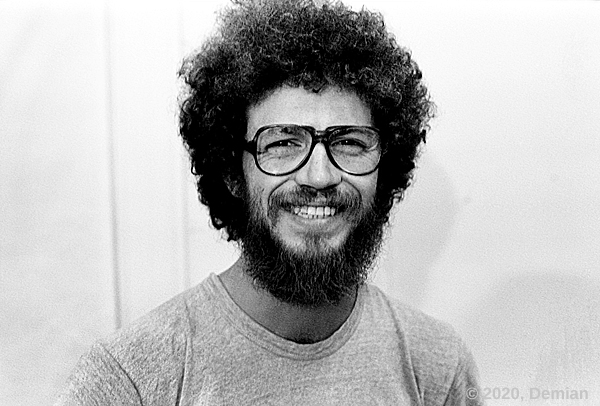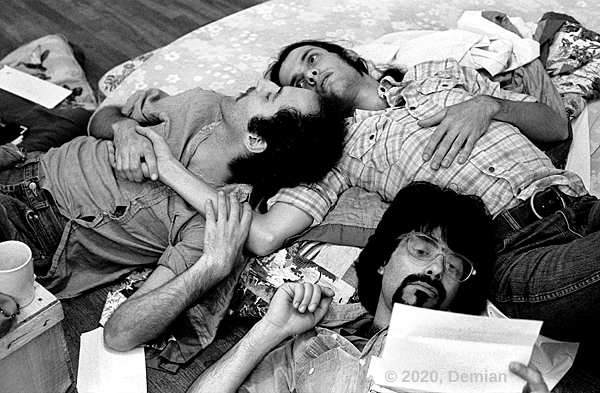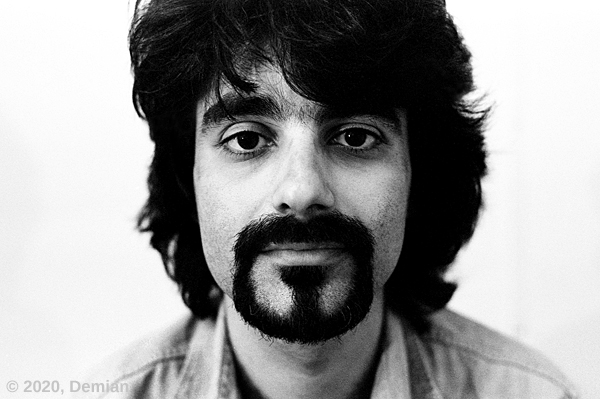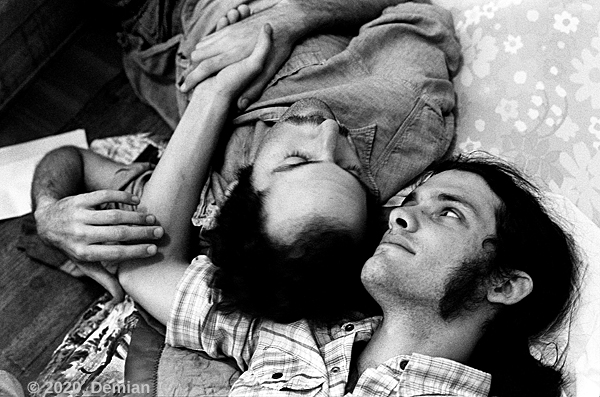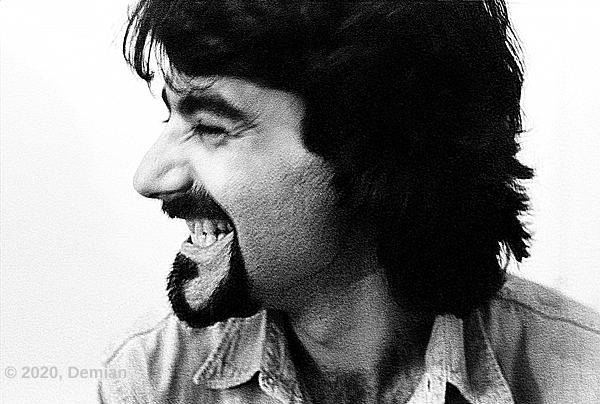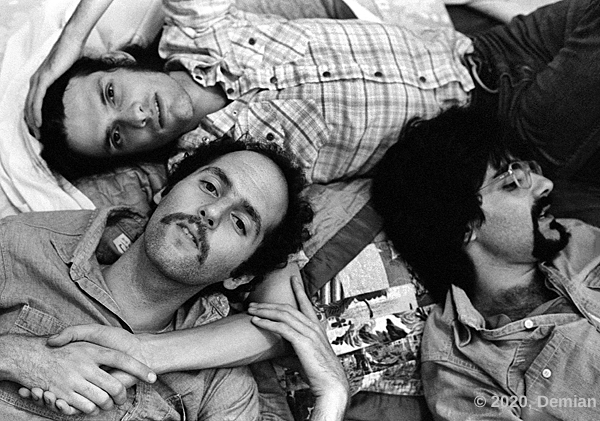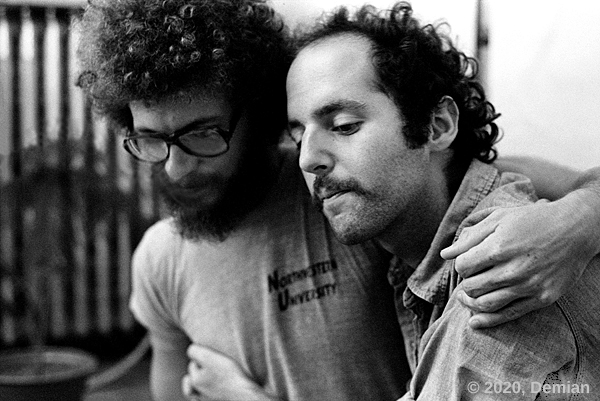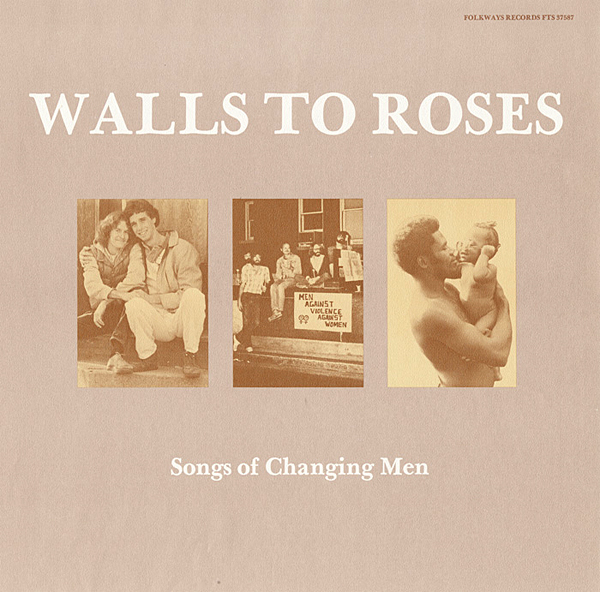
|
presentations that affirm self-esteem and social equality.
.
| MEDIA: Movies: Sweet Corn Vimeo YouTube Photos/Illos: Image Galleries Writings: Articles |
| SERVICES: Digital Production Image Retouch Puppets Script Doctor Shop |
| RESUMES: Directing Writing Visual Acting Web Programming About Sweet Corn About Demian |
|
Wall to Roses Willie Sordillo, George Fulginiti-Shakar, Michael Hussin, Kenny Arkin |
|
Images and Interview by Demian back to the Gallery Index
|
|
I first met George Fulginiti-Shakar at a Reevaluation Counseling men’s support group, on March 6, 1978. While it was a wonderful group with high-level skills, George was a special find. He was sociable, intelligent, dynamic, full of good energy and jokes. We shared many interests, especially in the arts. Over time, we attended classes in American Sign Language, Counseling workshops, and counseled each other in peer counseling sessions.
George was was always devoted to music and liberation issues.
When I was between apartments, I became a sub-tenant, in the beautiful home George rented. This lent itself to many late night discussions. Later, I got a small apartment on Broadway, in Cambridge, Mass, and for reasons I don’t remember, I wound up storing his big Hammond (B3?) organ, with the two keyboards, large pedals, and huge Leslie speaker. Altogether, the organ and speaker took up about one quarter of the living room. I loved to make up tunes, and “mood music” on it. George and many friends played on it when visiting.
I maintained a friendship, and communicated with George, for many years past the time I lived in Cambridge. He and Willie paid a visit, after I had moved to Seattle, on July 30, 1994. George visited one last time, on August 15, 1999.
In the late 70s, George’s good friend Willie Sordillo, was organizing a music collective of men, who where committed to addressing social issue such as sexism, and working with other men and women in non-competitive ways. |
|
Originally Published in WIN Magazine on January 25, 1979. The only two photos included, at that time, were the smiling image of Willie, and, the photo of Kenny, Michael, with George reading a letter.
The Walls to Roses: Songs of Changing Men album is ripe with political thought. It is emotionally and musically full and satisfying. The album presents us with several firsts and a dramatic departure from traditional male musical groups. While women’s recordings have been collectively done for some time now, i.e. Lavender Jane, Berkeley Women’s Music Collective and various Olivia recording artists, this is the first I’ve known of a male music collective. More importantly, it is a collective aimed at producing music that speaks to issues of sexism, and to men who are growing and changing and supporting women’s struggles. It strives for a more positive vision of masculinity. The song “Are You Karen Silkwood?” not only addresses the danger of nuclear energy and corporate/government ties and lies, but also frames the issue so as to express how Karen had to step out of the oppression of being a woman and a worker in order to collect evidence. Several songs on the album claim the right to give and get emotional support from other men. Non-gay as well as gays sing of helping each other’s struggles. ”The Matador” shows the folly of rigid male heroism. “Walls to Roses” soars with exuberance over learning to be friends with father, women and other men. ”Sensitive Little Boy” satirizes the labels that are forced on gay men and speaks out against role-playing. “Gay Spirit” is a celebration of future times of open love throughout the land.
The musical styles run from folkie and night club, to rock and jazz, with traces of Richie Havens and Jimmie Cliff in two numbers. It is always fresh, invigorating and thoughtful. The voices and lyrics are diverse. The total resulting sound has an impressive cohesiveness and emotional power that makes an enviable first album.
To raise money for recording and transportation, the collective put on two concerts in Cambridge last year. I enjoyed the first benefit on April 1, 1978. The second concert, on August 17, immediately following the taping of the album, impressed me even more.
The interpersonal energy of the performers was warm and friendly. This was the first time I’d ever heard and seen men playing for each other. I’d felt this occasionally among the women performers at women’s concerts, but never before among men. The energy, support and love given and accepted between members of the collective put them into high gear, and was an inspiration for the audience. The collective credits the women’s and gay liberation movements for leading them to examine the meaning of masculinity in our culture. They trace their immediate history to the “Third National Gathering on Men and Masculinity” in Des Moines, Iowa, in March 1977. Willie Sordillo and Geof Morgan (who has been distributing a cassette of his music) had played music there that spoke to the issues of sexism, men changing, and men supporting women’s struggles. They informally contacted others after the conference in an effort to make this kind of music more widely available. Willie, and various conferees, speculated forming a men’s arts task force, partly aimed at producing a record. Jeff Langley offered enthusiasm and encouragement. It wasn’t until almost a year later that Moses Asch, at Folkways, said that they’d press and distribute an album if the collective produced the tapes. Eventually, there was support from Joe Martin, who hosted the radio show, “Closet Space” on WCAS, Boston’s “Gay Community News,” and especially their writer, the liberation activist, Eric Rofes, Largely through Willie’s letter writing and persistence, the men’s music collective began. There were finally 17 members from all over the U.S., and the Collective combined efforts with six women to create the album.
The following interview took place on August 29, 1978,
with four of the collective’s members: Willie Sordillo, Michael Hussin, George Fulginiti-Shakar and Kenny Arkin. Demian When did the collective begin to function ?
Willie
Demian
Willie
Michael
Willie
Demian
Willie
Demian
Michael
George
Kenny I’d never played with other people. I’d just never thought of it. This changed everything. Thinking of myself as part of a whole and not feeling isolated. I’m taking it more seriously, I’m putting more energy into it, so the quality is better.
Demian
Michael People I’m performing with seem more interested in me, than what I can “cut” as a musician. As they give me more support for being a human being, my musical abilities will just flow out of that. As I relax I get more imaginative.
When I performed in high school, in male rock bands, I was getting squashed all the time. I was scared to death, ’cause it was a case of whether you could “cut it” or not. My father was a musician and
that was his attitude too: “Can you cut it?”
Kenny That pretty much disappeared, for a lot of the reasons that Michael was just saying, because there was support and there was encouragement. I felt at the end that I was standing as an equal with every other person. I haven’t felt that in the past … with men.
Willie
George I, and other people, were consistently putting our energy right there. We had long meetings, over-extensions and too many rehearsals. Through it all, people would agree on what they needed to do, give each other hugs and strokes, remember how important this was, and go back and do it again.
My respect for every single one of the people that I worked with is incredible. It’s superlative. I don’t think I’ve seen such dedication to an idea, to a cultural ideal, before, as I have with this group of men. I felt so supported.
Michael I think the fact that we had such a strong purpose, a strong goal, took us to a higher level of ability. It didn’t feel like a drain to me. There were times when I felt tired out, but I got by on four or five hours sleep, for five days.
Willie We didn’t know it was impossible. Also being sort of fresh, we wanted badly to get our best down on the record and capture the spirit of what we were feeling.
Kenny
Michael
Kenny
Willie
Demian
Kenny
Michael
Kenny
Willie
George
Michael
Willie
Michael
Demian is a cultural worker in the visual and performing arts. Images and interview are Copyright © January 1979, Demian
|
|
More Data
A Men’s Music Collective (1976-January 1, 1984)
Folkways Records (1948-1987)
Willie Sordillo (May 2, 1951)
Michael Hussin (July 9, 1951)
Kenny Arkin (1955-September 30, 1990)
George Fulginiti-Shakar (May 9, 1947-June 21, 2020)
All images were captured on a Pentax 35mm single lens reflex camera on August 27, 1978.
In 2020, the black and white Tri-X negatives were scanned using an Epson Perfection V500 Photo, captured in VueScan, and retouch using PhotoShop Elements. |
|
Sweet Corn Productions || 206-935-1206 || demian@buddybuddy.com sweetcornmedia.com || Seattle, WA || Founded 1971 All contents © 2023, Demian, Sweet Corn Productions |

